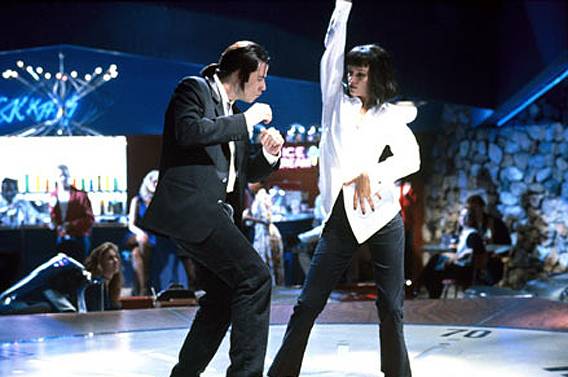Quentin Tarantino is the Jerry Lee Lewis of cinema, a pounding performer who doesn’t care if he tears up the piano, as long as everybody is rocking. His new movie “Pulp Fiction” is a comedy about blood, guts, violence, strange sex, drugs, fixed fights, dead body disposal, leather freaks, and a wristwatch that makes a dark journey down through the generations.
Seeing this movie last May at the Cannes Film Festival, I knew it was either one of the year’s best films, or one of the worst.
Tarantino is too gifted a filmmaker to make a boring movie, but he could possibly make a bad one: Like Edward D. Wood Jr., proclaimed the Worst Director of All Time, he’s in love with every shot – intoxicated with the very act of making a movie. It’s that very lack of caution and introspection that makes “Pulp Fiction” crackle like an ozone generator: Here’s a director who’s been let loose inside the toy store, and wants to play all night.
The screenplay, by Tarantino and Roger Avary, is so well-written in a scruffy, fanzine way that you want to rub noses in it – the noses of those zombie writers who take “screenwriting” classes that teach them the formulas for “hit films.” Like “Citizen Kane,” “Pulp Fiction” is constructed in such a nonlinear way that you could see it a dozen times and not be able to remember what comes next. It doubles back on itself, telling several interlocking stories about characters who inhabit a world of crime and intrigue, triple-crosses and loud desperation. The title is perfect. Like those old pulp mags named “Thrilling Wonder Stories” and “Official Detective,” the movie creates a world where there are no normal people and no ordinary days – where breathless prose clatters down fire escapes and leaps into the dumpster of doom.
The movie resurrects not only an aging genre but also a few careers.
John Travolta stars as Vincent Vega, a mid-level hit man who carries out assignments for a mob boss. We see him first with his partner Jules (Samuel L. Jackson); they’re on their way to a violent showdown with some wayward Yuppie drug dealers, and are discussing such mysteries as why in Paris they have a French word for Quarter Pounders. They’re as innocent in their way as Huck and Jim, floating down the Mississippi and speculating on how foreigners can possibly understand each other.
Travolta’s career is a series of assignments he can’t quite handle. Not only does he kill people inadvertently (“The car hit a bump!”) but he doesn’t know how to clean up after himself. Good thing he knows people like Mr. Wolf (Harvey Keitel), who specializes in messes, and has friends like the character played by Eric Stoltz, who owns a big medical encyclopedia, and can look up emergency situations.
Travolta and Uma Thurman have a sequence that’s funny and bizarre. She’s the wife of the mob boss (Ving Rhames), who orders Travolta to take her out for the night. He turns up stoned, and addresses an intercom with such grave, stately courtesy Buster Keaton would have been envious. They go to Jack Rabbit Slim’s, a 1950s theme restaurant where Ed Sullivan is the emcee, Buddy Holly is the waiter, and they end up in a twist contest. That’s before she overdoses and Stoltz, waving a syringe filled with adrenaline, screams at Travolta, “YOU brought her here, YOU stick in the needle! When I bring an O.D. to YOUR house, I’LL stick in the needle!” Bruce Willis and Maria de Medeiros play another couple: He’s a boxer named Butch Coolidge who is supposed to throw a fight, but doesn’t. She’s his sweet, naive girlfriend, who doesn’t understand why they have to get out of town “right away.” But first he needs to make a dangerous trip back to his apartment to pick up a priceless family heirloom – a wristwatch. The history of this watch is described in a flashback, as Vietnam veteran Christopher Walken tells young Butch about how the watch was purchased by his great-grandfather, “Private Doughboy Orion Coolidge,” and has come down through the generations – and through a lot more than generations, for that matter. Walken’s monologue builds to the movie’s biggest laugh.
The method of the movie is to involve its characters in sticky situations, and then let them escape into stickier ones, which is how the boxer and the mob boss end up together as the captives of weird leather freaks in the basement of a gun shop. Or how the characters who open the movie, a couple of stick-up artists played by Tim Roth and Amanda Plummer, get in way over their heads. Most of the action in the movie comes under the heading of crisis control.
If the situations are inventive and original, so is the dialogue. A lot of movies these days use flat, functional speech: The characters say only enough to advance the plot. But the people in “Pulp Fiction” are in love with words for their own sake. The dialogue by Tarantino and Avary is off the wall sometimes, but that’s the fun. It also means that the characters don’t all sound the same: Travolta is laconic, Jackson is exact, Plummer and Roth are dopey lovey-doveys, Keitel uses the shorthand of the busy professional, Thurman learned how to be a moll by studying soap operas.
It is part of the folklore that Tarantino used to work as a clerk in a video store, and the inspiration for “Pulp Fiction” is old movies, not real life. The movie is like an excursion through the lurid images that lie wound up and trapped inside all those boxes on the Blockbuster shelves. Tarantino once described the old pulp mags as cheap, disposable entertainment that you could take to work with you, and roll up and stick in your back pocket. Yeah, and not be able to wait until lunch, so you could start reading them again.



















